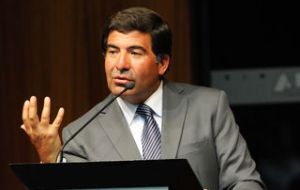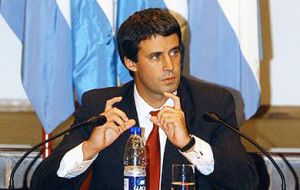MercoPress. South Atlantic News Agency
Argentine whitewash bill turning into ugly electoral debate
 Taxman Echegaray: ‘bring the dollars’
Taxman Echegaray: ‘bring the dollars’ Argentina’s whitewashing bill or more modestly ‘tax amnesty’ has joined the political debate of the coming October mid-term elections. The tax revenue bureau or AFIP confirmed taxpayers’ “legitimate externalization right” “will not be affected” even in the “hypothetical case that the opposition manages to rally a majority parliamentary stance” after October’s legislative elections.
According to a statement released by the AFIP, “no amendments will violate” such right, protected also by the ”fiscal secret institute, just like the 2009 whitewash was.”
The bill which was introduced last week by President Cristina Fernandez administration invites all Argentines, with undeclared dollar assets in the country or overseas to turn them legitimate by purchasing government bonds or promissory notes to be used in supporting mainly the construction and oil industries.
The operation which asks no questions and contrary to the whitewashing bill of 2009 will have no cost, was immediately targeted by the opposition which describes it as a desperate move by Cristina Fernandez government to recoup much needed US dollars, to help drug barons launder their money and to benefit Kirchner family cronies that are facing serious allegations of corruption and tax elusion, all money skimmed from government contracts.
The opposition also argues that the bill mocks good Argentines who pay their taxes, do not hoard dollars as imposed by the government and basically respect the rule of the law and are good neighbours with no intent of abusing or stealing government funds.
However the AFIP insists that the currency voluntary exteriorization sought by the Argentine government “abides by all international standards on fiscal transparency.”
The official statement also points out that the 2009 exteriorization program received “no objection from the Financial Action Task Force (FATF)” and adds that the OCDE Global Global Forum on Transparency and Exchange of Information for Tax Purposes “reported Argentina passed the peer review’s phases”.
The Forum’s report explains the mechanism relies on a three year mandate to peer review all the members and other jurisdictions which may require special attention. The peer reviews will encompass two phases: Phase 1 will review the legal and regulatory frameworks while phase 2 will assess the practical implementation of the standard. The reports will include recommendations to improve the situation in the reviewed jurisdictions.
Earlier in the week the main opposition blocks in the Argentine congress held a press conference saying that they will repeal the government's bill if they regain Congress control in October.
Later they also added that those who benefit from the whitewashing bill, currently under discussion in the Senate, will be investigated.
“When the next change of government and without violating fiscal secrets we are going to look into all those who benefited from the whitewashing. We are not only going to derogate the law but we are also committed to investigate all those who take advantage of the whitewash and are linked with government and the government ruling alliance”, pledged lawmaker and former Central bank president Alfonso Prat-Gay.
He added it was really noteworthy that “on the announcement of our investigation and repeal of the bill, taxman Ricardo Echegaray goes on his knees to beg drug barons, the corrupt and tax evaders “to ignore us and bring the dollars”.
“The government’s desperation is in line with this exhausted model; nobody lends money to Argentina and the only pockets to which the government can appeal are those full of blue or parallel market dollars”.
Finally opposition lawmakers revealed that a former AFIP head under President Nestor Kirchner summoned to congressional committees, alleged that businessman Lazaro Baez, a Kirchner crony was under investigation for tax evasion and fraudulent billing in 2009 when he was benefited by the whitewash bill. Several Baez companies under investigation at the time (Badial, Gotti Hermanos and Juan Felipe Gancedo) for avoiding taxes to the approximate value of 120 million dollars finally managed through political influence to get the AFIP inspectors off and laundered the money.
“As a consequence several AFIP staff resigned or were removed to other government areas. This new version of the bill will only benefit the friends of power and will open the door to those assets originated in illicit activities”, said former AFIP chief Alberto Abad.
Opposition Senator Ernesto Sanz also disclosed that the 2009 whitewash bill helped another very close crony of the Kirchner family: Cristobal Lopez, who now dominates the Argentine gambling industry. Four years ago he laundered 1.600 million Pesos, which apparently he used to purchase part of an oil company and several media.





Top Comments
Disclaimer & comment rules-

-

-

Read all commentsAfter October ,when the opposition has a majority it should pass a bill to investigate where every dollar came from!
May 17th, 2013 - 07:21 am 0We are now seeing the beginning of the end,
May 17th, 2013 - 09:52 am 0And the end of the beginning
With CFK at the wheel ..gulp!
.
If this passes Argentina may be branded a Narco State.
May 17th, 2013 - 10:33 am 0The worldwide news articles about this are an embarrassment.
Does she not remember what we did to the leader of Panama?
desperate and stupid
desperate and stupid
Commenting for this story is now closed.
If you have a Facebook account, become a fan and comment on our Facebook Page!